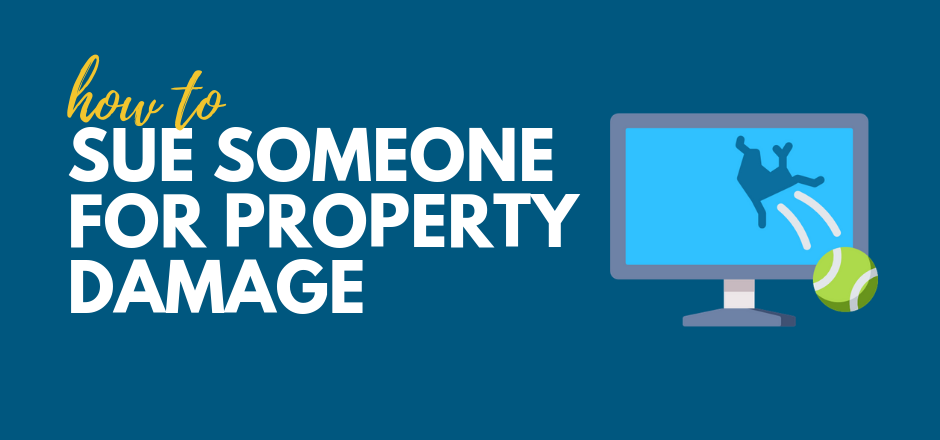How to Sue Someone for Property Damage
If your property was damaged and you’re interested in exploring your legal options, you may be interested in learning more about filing a lawsuit to cover the damages.
In this article, you will discover how to sue someone for property damage as well as when it is (and isn’t) appropriate.

How to Sue Someone for Property Damage
Property is loosely defined as anything tangible that belongs to you. This includes your car, your house, your clothing — even your pets and the food in your refrigerator. But what happens if someone else intentionally or accidentally causes damage to that property, especially when it’s considered valuable?
When someone else harms your property, you become a victim of property damage. Whether it’s intentional doesn’t matter; you still have the right to seek compensation for repair or replacement of your goods.
The problem? Not every case is viable, and winning can be very difficult. Get to know this area of law, and how it can help you protect your rights.
What is Property Damage?
By definition, property damage is “injury to real or personal property through another’s negligence, willful destruction, or by some act of nature.” The law categorizes property damage in three distinct ways:
- Negligent property damage: When someone’s carelessness directly results in harm. For example, if a neighbor’s tree falls onto your roof and causes damage, it may be considered negligent because they didn’t take proper care of it.
- Accidental property damage: When someone causes damage, yet it wasn’t intentional. If someone drops your phone in a puddle after borrowing it to make a call, they didn’t mean to break the device – but it still happened.
- Malicious property damage: When someone means to harm your property out of rage, spite, or a desire to hurt you. This includes vandalism and/or attacks (like slashing your vehicle tires after an argument).
On occasion, Nature does play a role in property damage – including minor storms and downed trees to major catastrophes caused by hurricanes, tornadoes, and similar weather phenomena.
While there isn’t much you can do about nature, aside from filing an insurance claim, you do have the right to request compensation for property damage caused by others. This may mean filing a claim with their insurance carrier or, in some cases, taking them to court.
Doesn’t Insurance Cover Property Damage?
Some insurance premiums cover property damage, but coverage may be highly dependent on the scenario. Let’s say you’re in a car accident caused by another car and driver. That driver’s insurance may pay for the damage to your vehicle, but only if they carry a high enough property damage liability limit to cover the damage to your car. If they only have a limit of $5,000 and the damage to your car is $8,000, you may have to sue the driver for the $3,000 difference in order to repair your car.
Other types of property damage may be covered under your homeowner’s insurance policy, but only under certain circumstances. If your teenager hits a baseball and it flies through your neighbor’s window, the liability section of your policy may cover you. If you are mad at your neighbor and intentionally hit a ball through his window, you will not be covered. Negligence (like not telling your teen to not play baseball near windows) is usually covered, but willful acts are not.
What if the Property Damage Was an Accident?
Accidents happen and are usually unexpected and unintentional. The reality is that there are very few accidental situations that don’t have some sort of cause and effect or human error attached to them. Let’s say, for example, you are walking an antique vase from a house to the car and trip over a crack in the sidewalk. The vase crashes to the ground and is destroyed.
Tripping on the crack was an accident, but the homeowner may be negligent because the crack was there for you to trip on to start with. A reasonable homeowner would have repaired the crack or temporarily filled it in in some way – if he’d even noticed it yet. Even worse, antiques have very limited coverage under a homeowner’s policy, so you may not get the full value of the vase by filing a claim. If it was really important to you or didn’t belong to you, the homeowner might be sued for the value.
Accidents are unfortunate and are often understandable and forgivable. That said, the lack of intention doesn’t absolve people of their responsibilities when it comes to paying for the damages their accidents cause. Depending on the scenario and the severity of the damage, you may need to decide if you will take a family member, friend, or neighbor to court to recoup your related financial costs.
What About Intentional Damage?
It doesn’t matter if it’s road rage, an aggressive neighbor dispute, or some other situation; intentional damage to your property isn’t just unacceptable – it’s illegal. Call the police immediately if you suspect your home or property was damaged on purpose (or if you witnessed it happening). Depending on the severity of the damage, the individual in question may be charged with a misdemeanor or felony for vandalism or destruction of property. This type of crime can come with fines or jail time, depending on the nature of the crime and the defendant’s past history.
How to Sue in Small Claims Court
For smaller claims, you can take the defendant to small claims court. People often take this route for small claims or when there is a failure to follow through on a previous promise to pay. In small claims court, you need to demonstrate property damage and prove it was the defendant’s fault – while also proving the property’s value, too. Bring any documentation you have that provides evidence of a promise to compensate; the presiding judge can order the defendant to honor the original agreement.
Hiring a Lawyer to Sue for Property Damage
For larger or more complicated claims, especially claims involving a lack of insurance coverage or an intentional act, you should definitely consult a lawyer. Your lawyer will help you determine if you have a viable case. He or she will then work together with you to prove whether your claim is based on an intentional act or negligence.
Negligence can be tricky. You have to prove that the defendant was aware that there was a problem but did not take reasonable action to correct it. This means proving your neighbor knew their tree was old and could fall on your fence – or that your landlord knew he had old rusty pipes that might burst and destroy everything you had stored in the basement.
At the end of the day, you can only ever receive the current value of the property as compensation. You will either receive what you need to make repairs or the amount you need to replace the item as it was the day it was damaged. You won’t receive enough money to buy a new car, even if your car was totaled. You’ll receive enough to replace what you had with a car of similar age and value.
Not sure if you have a case? Call a lawyer. Yes, accidents happen and not all property damage is intentional, but sometimes fault is a factor. No matter what the reason, though, you deserve to be made whole again.
Are you in search for a certified attorney to represent you?
Let us help you find one today!


I was in an auto accident I was hit in the rear I was taking them to court for my accident they totaled my vehicle I was wondering do I have a case to recover payments that I had to put out to get another vehicle that was destroyed the insurance company paid off the old car that was destroyed but it left me to pay for a new one without any help and now I have to start all over again
Hi Rick,
It sounds like you may need the help of an experienced auto accident attorney – if you’re in Los Angeles, we can help match you with one near you.
In most cases, we can set up a free consultation so you have the opportunity to decide whether or not you have a case.
Let us know a little more about the matter here.
My roommate is suing me for property damage, but it was her negligence thet caused the damages of het cracked iPad. What should I do?
Knem,
This type of dispute will likely be handled in small claims court. Take a look at this article to learn how to prepare.
The cable communications was digging in front of my house and they broke my sewer. And the didn’t noticed my now I have plugged all my house what can I do?